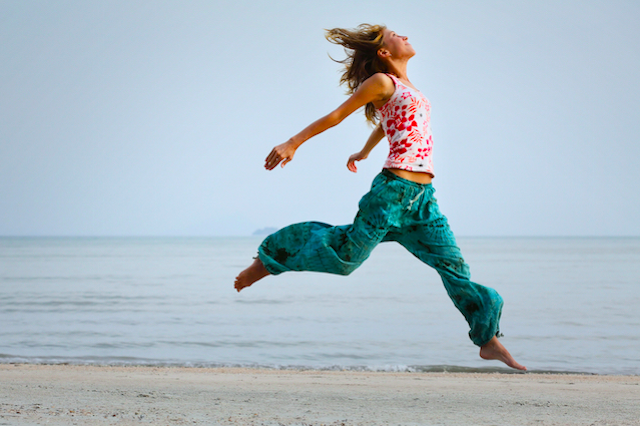
“The modern individual is committed to being successful, not to being a person. He belongs rightly to the ‘action generation’ whose motto is ‘do more but feel less.’” ~Alexander Lowen
I’ve always been a little bit scared of my body. And when you’re scared of something, you tend to avoid it at all costs. So that’s what I did for most of my childhood and teenage years.
I avoided it in lots of different ways, and most dangerously, I avoided it unconsciously.
I was bought up doing a lot of physical activity—gymnastics, dance, basketball, and horseback riding. Although this wasn’t bad, the perspective I developed was. I grew up seeing my body as a challenge to overcome—something to will into performing better.
Moving into my awkward pre-teen and teen years, surrounded by an image-obsessed culture where our bodies are displayed in a hierarchy of perfect to undesirable, I started to rank myself.
It was inevitable that I’d become even more isolated from my body. I stopped playing sports as much, feeling too insecure to lose myself in something I enjoyed, and started feeling embarrassed about my body altogether.
I had an idea of what I should have looked like, but it seemed impossible to mirror that image without feeling miserable.
It was as if my body didn’t belong to me anymore. Other people’s preferences determined the way it moved and how it looked.
I neglected the conversation my body was trying to have with me.
We are a head culture, and increasingly so. We spend a scarily large portion of our lives inside our minds. Whether it’s on Facebook, talking on the phone, listening to music through headphones, or staring at screens, our physical interaction with the world is limited.
It’s rare for us to use our bodies physically in any activity. Even when we exercise, we often have the ultimate ego goal of looking good in our minds, not feeling good.
I realized that my mind had become so loud, and with university coming up and more responsibility looming, it was just going to get louder.
One day, by chance, I came across bioenergetics.
Bioenergetics is a form of therapy that seeks to understand personality through the expression of our bodies. Its most fundamental principle is that what goes on in the body affects the mind, and vice versa.
Essentially, the mind and the body are the same thing.
This was groundbreaking to me, because I had always thought of myself as two separate entities—the mind in control and the body along for the ride.
Exploring bioenergetics further, I started to practice calming my busy mind through paying attention to the physical sensations in my body.
I would stretch every morning, not using any particular routine, just allowing myself to move, and in turn, relinquishing any sense of control over my body.
I learned to let myself breathe in a way that made me feel good. Not with the shallow breaths I was used to taking from years of sucking in my stomach, but deep, indulgent belly breaths. The satisfaction and happiness I felt from simply breathing deeply was phenomenal.
I learned that being exhausted doesn’t indicate a “good workout,” but that my body was telling me I had done too much.
I would go on these intense runs and not even be aware of myself until I was home, sweating, and bright red in the face. Why do we force our bodies to run that extra mile if they’re screaming at us to stop?
In a society that values power and progress, our bodies can sometimes take the role of subordinate, working beneath our minds.
We want to achieve more, so we repress feelings of tiredness in the name of getting more done. We ignore tough emotions, like sadness, because we think we have to put on a happy face to the world around us.
When you listen to your body, you get a greater sense of your emotions flowing within you. Allowing your emotions and feelings to surface and be expressed, as opposed to repressing them, is a recipe for happiness.
It takes courage to give in to how you feel, but when I started doing this, I wasted less energy trying to hide my real feelings.
Instead of runs, I tried going for walks, moving slowly and sensually, with purpose, being completely aware and engaged with myself and everything around me. It has proven to be a much more enjoyable experience.
And why not enjoy our bodies?
Our heads are a seductive place to live because inside them, we feel we have complete control. But through having complete control, are we really enjoying life more? The gaping void between a mind that can’t be quiet and a body that is a dozen steps behind causes us nothing but stress.
Sometimes we need to let go of our heads and follow our hearts. To truly experience life is to allow the thinking in our head to mute and the feelings and sensations in our bodies to amplify.
Next time you’re going somewhere, pay attention to everything you feel in your body as you walk. Try not to plan what you’re going to do when you arrive; just stay very present with your body in the moment you are.
Think of children playing, and how much excitement and joy they get from just moving and being in their bodies. There is no reason we can’t be like this again. We just need to trust in our bodies—in ourselves.
I turned against my body and the intricacies of its needs, all in the name of progress—in order to look better, run faster, perform more accurately. I now know that our bodies are our gateways to the world; and unless we are fully living in them, our presence will be limited and the world will pass us by.
About Erin Mahoney
Erin Mahoney is currently at university studying Creative Writing. She writes performance poetry, and she believes that everyone should have the right to express what is deep and personal to them. When she’s traveling she’s in her happy place. She would love to share her stories with you, and if you fancy sharing yours with her head to her travel blog Tracks.


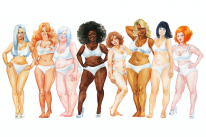
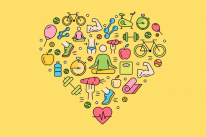
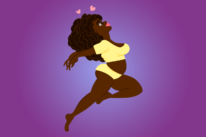


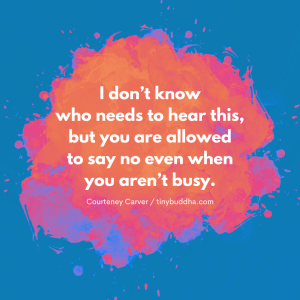





 Though I run this site, it is not mine. It's ours. It's not about me. It's about us. Your stories and your wisdom are just as meaningful as mine.
Though I run this site, it is not mine. It's ours. It's not about me. It's about us. Your stories and your wisdom are just as meaningful as mine. 